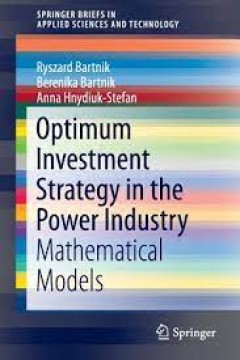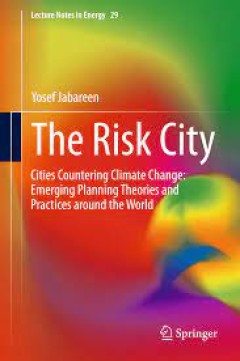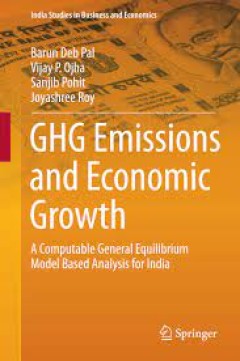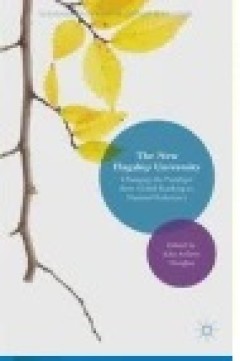Filter by

Optimum Investment Strategy in the Power Industry Mathematical Models
This book presents an innovative methodology for identifying optimum investment strategies in the power industry. To do so, it examines results including, among others, the impact of oxy-fuel technology on CO2 emissions prices, and the specific cost of electricity production. The technical and economic analysis presented here extend the available knowledge in the field of investment optimizati…
- Edition
- -
- ISBN/ISSN
- 978-3-319-31872-1
- Collation
- -
- Series Title
- -
- Call Number
- -

The Risk City Cities Countering Climate Change: Emerging Planning Theories a…
Contemporary cities face phenomenal risks, and they face particularly high levels of mounting social and environmental risks, including social polarization, urban conflicts, riots, terror, and climate change threats. This book suggests that climate change and its resulting uncertainties challenge the concepts, procedures, and scope of conventional approaches to planning, creating a need to reth…
- Edition
- -
- ISBN/ISSN
- 978-94-017-9768-9
- Collation
- -
- Series Title
- -
- Call Number
- -

Integrating Immigrants in Europe Research-Policy Dialogues
This open access book explores how research and policymaking in the field of migrant integration have developed historically and how this interrelationship plays out in the strongly politicised climate of opinions on migration in Europe. It features interdisciplinary theoretical contributions as well as original empirical studies on research-policy dialogues at both the EU and country level. …
- Edition
- -
- ISBN/ISSN
- 978-3-319-16256-0
- Collation
- -
- Series Title
- -
- Call Number
- -

New Theory of Discriminant Analysis After R. Fisher
This is the first book to compare eight LDFs by different types of datasets, such as Fisher’s iris data, medical data with collinearities, Swiss banknote data that is a linearly separable data (LSD), student pass/fail determination using student attributes, 18 pass/fail determinations using exam scores, Japanese automobile data, and six microarray datasets (the datasets) that are LSD. We deve…
- Edition
- 1
- ISBN/ISSN
- 978-981-10-2164-0
- Collation
- XX, 208
- Series Title
- -
- Call Number
- -

GHG Emissions and Economic Growth A Computable General Equilibrium Model Bas…
Issues linking climate change and economic growth are now at the centre of discussions regarding development strategies especially in the context of developing countries. This book contributes by analyzing the relationship between economic growth and GHG emissions in India with explicit reference to all major economic sectors. One of the most popular tools for macroeconomic policy analysis is S…
- Edition
- -
- ISBN/ISSN
- 978-81-322-1943-9
- Collation
- -
- Series Title
- -
- Call Number
- -

GALILEO Positioning Technology
This book covers multi-band Galileo receivers (especially E1-E5 bands of Galileo) and addresses all receiver building blocks, from the antenna and front end, through details of the baseband receiver processing blocks, up to the navigation processing, including the Galileo message structure and Position, Velocity, Time (PVT) computation. Moreover, hybridization solutions with communications syst…
- Edition
- -
- ISBN/ISSN
- 978-94-007-1830-2
- Collation
- -
- Series Title
- -
- Call Number
- -

Efficiency of Manufacturing Processes Energy and Ecological Perspectives
This monograph presents a reliable methodology for characterising the energy and eco-efficiency of unit manufacturing processes. The Specific Energy Consumption, SEC, will be identified as the key indicator for the energy efficiency of unit processes. An empirical approach will be validated on different machine tools and manufacturing processes to depict the relationship between process paramet…
- Edition
- -
- ISBN/ISSN
- 978-3-319-17365-8
- Collation
- -
- Series Title
- -
- Call Number
- -

Efficiency and Competitiveness of International Airlines
This book focuses on the factors that support the strengths of international airlines in general and the Asian airline carriers in particular. Defining the quality of human capital as the level of education and the competence of airline employees, it analyzes the efficiency of 39 airlines in various regions, both in terms of production and cost structures. It argues that, despite Asia’s well-…
- Edition
- -
- ISBN/ISSN
- 978-981-10-1017-0
- Collation
- -
- Series Title
- -
- Call Number
- -

The Pedagogy of Standardized Testing: The Radical Impacts of Educational Stan…
Based on a large-scale international study of teachers in Los Angeles, Chicago, Ontario, and New York, this book illustrates the ways increased use of high-stakes standardized testing is fundamentally changing education in the US and Canada with a negative overall impact on the way teachers teach and students learn. Standardized testing makes understanding students' strengths and weaknesses mor…
- Edition
- -
- ISBN/ISSN
- 978-1-137-48665-3
- Collation
- XIV, 240
- Series Title
- -
- Call Number
- -

The New Flagship University
The New Flagship University is an expansive vision for leading national universities and an alternative narrative to global rankings and World Class Universities. The Flagship model explores pathways for universities to re-shape their missions and operational features to expand their relevancy in the societies that gave them life and purpose.
- Edition
- -
- ISBN/ISSN
- 978-1-137-50049-6
- Collation
- XXI, 217
- Series Title
- International and Development Education
- Call Number
- -
 Computer Science, Information & General Works
Computer Science, Information & General Works  Philosophy & Psychology
Philosophy & Psychology  Religion
Religion  Social Sciences
Social Sciences  Language
Language  Pure Science
Pure Science  Applied Sciences
Applied Sciences  Art & Recreation
Art & Recreation  Literature
Literature  History & Geography
History & Geography